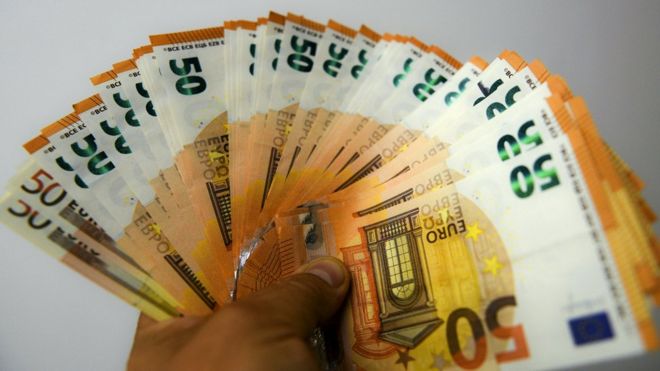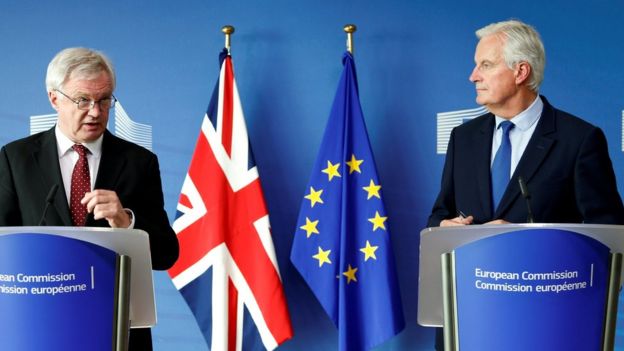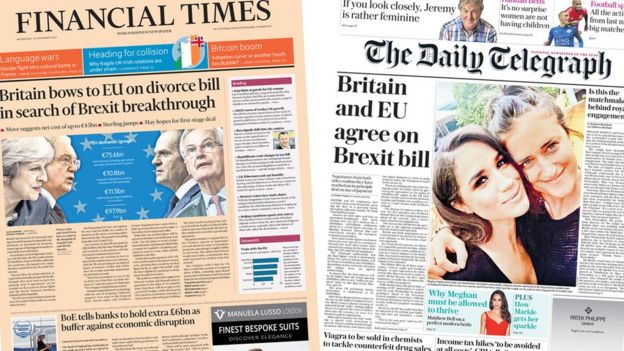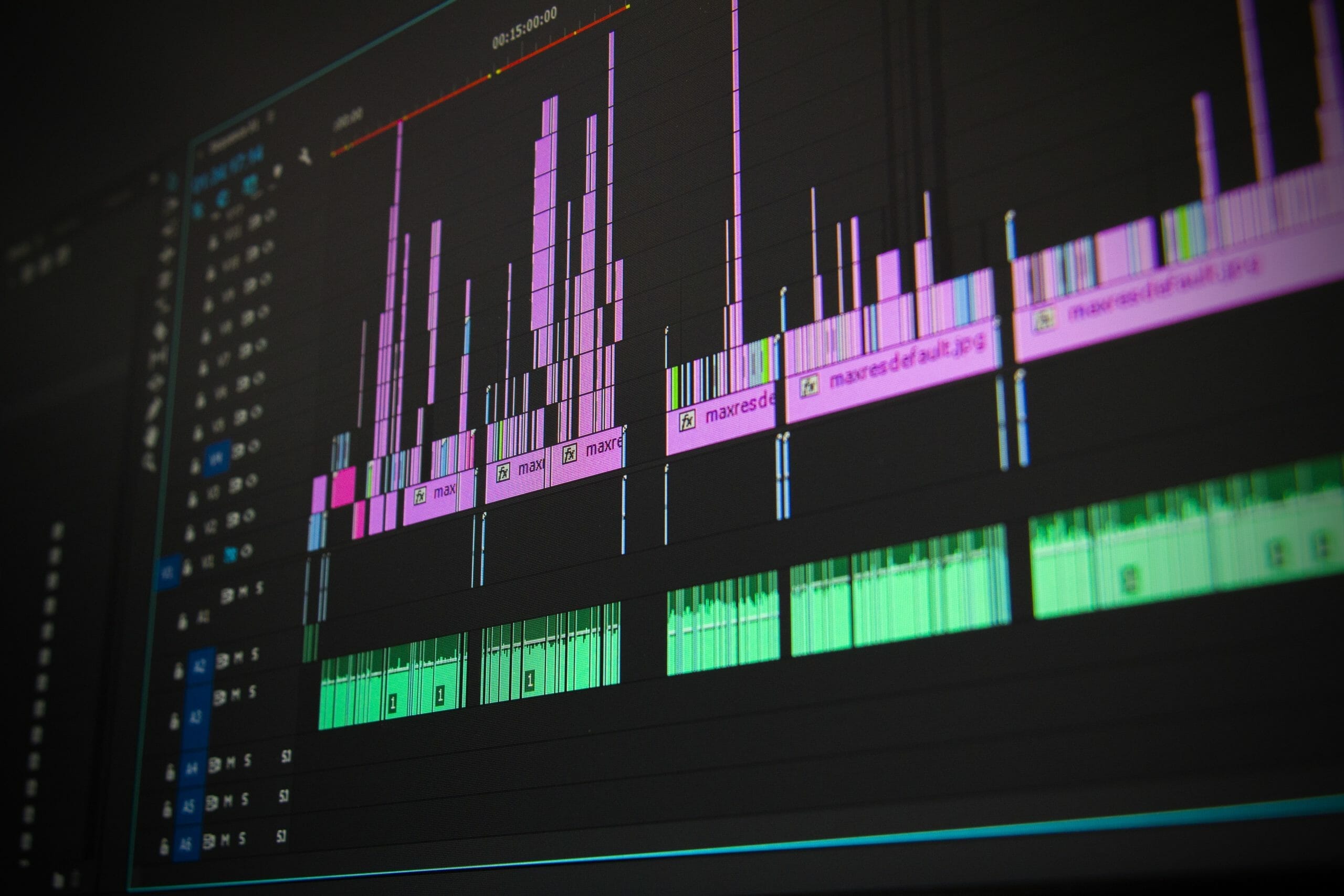 Image copyrightGETTY IMAGES
Image copyrightGETTY IMAGESThe UK has offered a larger potential “divorce bill” to the EU – which could be worth up to 50bn euros (£44bn), the BBC understands.
There has been no final agreement on a number but the offer was given a “broad welcome” by Brussels, BBC political editor Laura Kuenssberg said.
No 10 has played down reports the final figure could be up to 55bn euros (£49bn).
The offer was communicated to Brussels after last week’s cabinet meeting.
The amount of money the UK will pay as part of Brexit has been one of the main sticking points in the first round of negotiations with the EU.
In September Theresa May suggested the UK was willing to pay about 20bn euros, and the EU has been calling for its offer to be increased.
The UK is hoping to move on to talking about trade but the EU will only do this when it deems “sufficient progress” has been made on three areas – the so-called divorce bill, the rights of EU citizens in the UK after Brexit and the Irish border.
What’s the bill for?
 Image copyrightREUTERS
Image copyrightREUTERSThe EU says the UK needs to settle its accounts before it leaves. It says the UK has made financial commitments that have to be settled as part of an overall withdrawal agreement.
The UK accepts that it has some obligations. And it has promised not to leave any other country out of pocket in the current EU budget period from 2014-20.
But the devil is in the detail.
There are also issues like pensions for EU staff, and how the UK’s contribution to these is calculated for years to come, and the question of what happens to building projects that had funding agreed by all EU members including the UK but which will only begin construction after the UK has left.
Large amounts of the EU’s budget are spent in two areas – agriculture and fisheries, and development of poorer areas.
Projects include business start-ups, roads and railways, education and health programmes and many others.

Pressure is mounting to make progress on the Brexit talks before a crunch summit in mid-December, when EU leaders will decide if enough progress has been made on the first set of subjects – also including the Irish border and citizens’ rights – to open negotiations on a future trade deal between the EU and the UK.
According to the Daily Telegraph and the Financial Times, agreement has now been reached between the two sets of negotiators on how the bill could be calculated.
Downing Street has played this down, with a source saying: “Negotiations are ongoing. There is, as yet, no settlement.”
A spokesman for the EU’s chief negotiator Michel Barnier declined to comment.
The BBC understands detailed conversations are still taking place on which specific components will be included in the final bill and how those components are calculated.
But both sides of the EU debate are already having their say, and neither sound very happy. The pro-Remain Open Britain group said the “colossal cost of Brexit” would be a “bitter pill to swallow” for voters.
So do we know what the number will be?
At the moment no. But there appears to have been an agreement on the way that the amount the UK pays will be calculated and the BBC understands that the range of possible settlements is between approximately 40bn and 55bn euros.
Transport Secretary Chris Grayling told BBC Radio 4’s Today: “There’s lots of speculation around numbers. There are no numbers for us to discuss this morning. We haven’t committed to numbers, what we’ve simply said is that we will fulfil our obligations built up during our period of membership.
“We want to leave as good friends, good neighbours, carry on trading with the European Union. It’s right and proper that we meet our obligations and that’s what we’re intending to do.”
The European Union’s chief negotiator, Michel Barnier, declined to answer questions about the figure when asked about it by the BBC in Berlin: “I don’t want to talk. Still working. Still working.”
What’s going on behind the scenes?
By Laura Kuenssberg, BBC political editor
Both sides are discussing now whether the two key officials, Olly Robbins (the PM’s top Brexit adviser) on the UK side, and Sabine Weyand (Michel Barnier’s deputy) on the EU side can produce a joint paper, what’s been described to me as an “agreed truth”, before next Monday.
The idea is that the negotiating rivals can come together to formalise what has been agreed so far, to write it down in black and white so that the conclusions of phase one can be closed, signed off, and by implication, not unpicked at a later stage in the future dramas of the second bit of the deal-making.
In the possible scenario that everyone likes it (and I’m not suggesting this is in any way a dead cert) the paper may be published at the end of this week potentially.
The message from negotiators to the rest of the EU – this is where we agree that we have got to, up to you to agree whether, in political terms, that is progress enough.
And remember while the decision to move on or not lies officially with the European Council, the 27 political leaders, they will act on the basis of what’s recommended by their negotiating team.
So if the joint paper does emerge, it will be a big hint that moving on is nigh.
What’s happened now?



